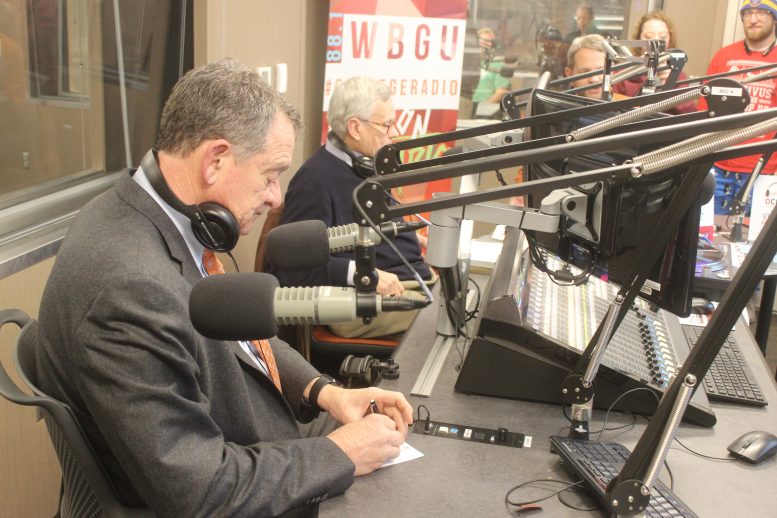By DAVID DUPONT
BG Independent News
There was a summit meeting Monday afternoon in a WBGU-FM studio.
Bowling Green State University President Rodney Rogers and Bowling Mayor Richard Edwards joined Owens Community College President Steve Robinson in the studio — the main topic of discussion wasn’t town-gown relationships, or economic development or state funding.
The concern at hand was music, specifically jazz captured on vinyl records.

Robinson hosts a biweekly radio show, The Vinyl Hour, originating from his home campus. He took the show on the road and crossed the AM-FM divide in the process, to sit down and wax nostalgic about music.
Both Edwards and Rogers have backgrounds in music.
Edwards has played saxophone since his teen years, when he sometimes joining bands performing at Cedar Point with special dispensation from the musicians union. He’s been active in the Bowling Green Area Community Band since its founding.
Rogers has his bachelors degree in music. His specialty — German art songs.
The session came about, Robinson explained, after separate breakfast meetings with Edwards and Rogers, in which their mutual love of music emerged.
Robinson said he took bass lessons at Michigan State while he was a student there and worked as a disc jockey at WDBM. Robinson got all three of his degrees at Michigan State.
Edwards showed up with a tote bag of goodies, and Robinson had an even larger bag of records.
Rogers walked over from his office at neighboring McFall without any music in hand, but did make a selection from Edwards’ bag.
He talked about how he moved from music into accounting, and eventually to the presidency of BGSU.
After graduating from Ohio Northern with a degree in music, his father asked him how he planned to make a living.
Ironically he wasn’t interested in teaching, and he didn’t feel he was accomplished enough to make it as a performer. His transition happened at BGSU, where he came to get an MBA, and took a number of accounting courses. He practiced as an accountant for a decade before going into academia.
He did earn some money to help pay his way through college by playing saxophone in The Moonlighters, a local big band.
He said during his recent move into the president’s house he discovered he still has his alto saxophone. Edwards encouraged him to get it fixed up and join the community band.
When he went through Edwards’ stash of records he picked out a familiar tune, “Take the A Train.” The version of the Duke Ellington Orchestra’s theme song was performed by the Stan Kenton Band.
The mayor pointed out the screaming high note trumpet work of Maynard Ferguson on the climax. Edwards recalled that Ferguson performed at least twice at BGSU. Edwards paid tribute to the late Wendell Jones, the percussion professor who helped launch jazz studies on campus.
Back in the 1970s and early 1980s that was considered daring. It had some people “on edge,” Edwards said. Some questioned why the university would teach jazz.
He and Rogers agreed that the arts can be and should be used more to link the university and the community.
Robinson said he’d like to see greater “synergy” between Owens and BGSU’s music program.
They were there to listen to jazz. Edwards said from the time he was a teenager — he graduated from high school in 1957 — he loved the West Coast sound.
He made sure the student engineer Drew Vogelpohl spun “Jeepers Creepers” by the Dave Brubeck Quartet featuring his musical hero Paul Desmond on alto saxophone. His first track, though, was the more rambunctious “Drum Boogie” played by Gene Krupa. Edwards recalled hearing Krupa play during a half time show in the Big House at University of Michigan.
Robinson still actively collects records. When traveling between Owens’ Toledo and Findlay campuses, he’ll often stop in Bowling Green to shop at Finders Records.
Robinson opened the show with a track by reed virtuoso Eric Dolphy, and then by Dolphy’s former employer Charles Mingus. That tune, “Fables of Faubus,” was named for Orval Faubus, an Arkansas governor who opposed racial integration.
The track, usually played as an instrumental, has band vocals that serve as a history lesson, Robinson said.
The session wound down as first Rogers and then Edwards had to depart to tend to their duties, ceding the air to Vogelpohl and his program “Tear Down the Walls.”
Despite the age difference, the dignitaries treated Vogelpohl, the station’s programming director, as a kindred spirit. “You’re the cool one,” Edwards said.

